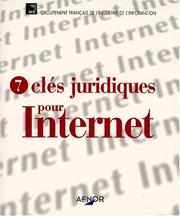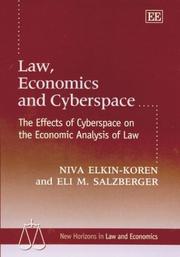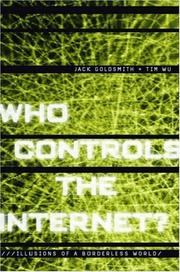| Listing 1 - 10 of 119 | << page >> |
Sort by
|

ISBN: 2124650335 9782124650330 Year: 1998 Publisher: Paris Afnor
Abstract | Keywords | Export | Availability | Bookmark
 Loading...
Loading...Choose an application
- Reference Manager
- EndNote
- RefWorks (Direct export to RefWorks)
Internet --- Law and legislation --- Internet - Law and legislation - France
Book
ISBN: 9782711026708 2711026701 Year: 2017 Publisher: Paris : LexisNexis,
Abstract | Keywords | Export | Availability | Bookmark
 Loading...
Loading...Choose an application
- Reference Manager
- EndNote
- RefWorks (Direct export to RefWorks)
Le "droit de l'internet" n'est plus aujourd'hui ce qu'il était lors de la première édition du présent ouvrage. L'appellation peut d'ailleurs aujourd'hui paraître réductrice, tant les évolutions technologiques et économiques ont transformé la matière. Les enjeux juridiques sont également plus complexes, avec notamment la montée en puissance du droit des données. C'est donc une profonde refonte de l'ouvrage précédent qui est ici proposé dans cette 3e édition tenant compte de ces transformations, et des perspectives qu'elles pourraient ouvrir.Les auteurs se sont attachés à conserver le choix éditorial initial consistant à privilégier un exposé simple et clair de solutions à des questions pratiques : quelles sont les précautions juridiques à prendre avant de lancer un site web éditorial ou marchand Qui est responsable des contenus mis en ligne ? Comment s'organise la publicité digitale ? De quelle manière collecter des données sur Internet ? Un nom de domaine peut-il coexister avec une marque identique ? Quelles sont les bonnes pratiques contractuelles ? Leur expérience d'avocats pratiquant le droit de l'internet depuis de nombreuses années est ici mise à profit. Dans le même temps, le lecteur trouvera à la fois des éléments de réflexion et une mise en perspective sur cette matière mouvante qui touche chacun quotidiennement.L'ouvrage s'adresse à tous les juristes, qu'ils soient avocats, magistrats, juristes d'entreprise, étudiants, mais aussi à tous les acteurs du digital : opérateurs de sites web, professionnels de l'ecommerce ou de la publicité en ligne, etc.
Internet --- Law and legislation --- Droit --- Internet - Law and legislation - France

ISBN: 1840646691 9781840646696 Year: 2004 Publisher: Northhampton (Mass.): Elgar,
Abstract | Keywords | Export | Availability | Bookmark
 Loading...
Loading...Choose an application
- Reference Manager
- EndNote
- RefWorks (Direct export to RefWorks)
Internet --- Law and economics. --- Law and legislation. --- Internet - Law and legislation.
Book
ISBN: 9782881970597 2881970591 Year: 2004 Publisher: [place of publication not identified] CEDIDAC
Abstract | Keywords | Export | Availability | Bookmark
 Loading...
Loading...Choose an application
- Reference Manager
- EndNote
- RefWorks (Direct export to RefWorks)
E-books --- Personal Internet use in the workplace. --- Labor productivity. --- Internet - Law and legislation. --- Internet
Book
ISBN: 9062156940 9789062156948 Year: 2000 Publisher: Antwerpen Maklu
Abstract | Keywords | Export | Availability | Bookmark
 Loading...
Loading...Choose an application
- Reference Manager
- EndNote
- RefWorks (Direct export to RefWorks)
Over het boek: Naast talrijke kansen en mogelijkheden tot communicatie houdt het Internet ook nieuwe bedreigingen en risico's in. Hoe betrouwbaar is de informatie die wordt aangeboden? Geldt de vrijheid van meningsuiting ook voor gevoelige informatie, bijvoorbeeld van racistische of pornografische aard? Kan de gebruiker vrijelijk informatie inwinnen zonder dat zijn zoektocht tot in detail geregistreerd wordt en de gegevens voor andere doeleinden gebruikt worden? Is het veilig om aankopen te doen via het Internet? Tal van vragen die betrekking hebben op de fundamentele rechten van elke gebruiker van het Internet, en dat zijn intussen allemaal. Voldoende reden voor de auteurs van deze bundel om een bijdrage te wijden aan de rechten van de mens op het Internet. Het tweede deel (rechtsleer en rechtspraak) verscheen in afzonderlijke uitgave (zie Jaarboek Mensenrechten 1997-98 (deel 2) ISBN 90 6215 740 8) Uit de inhoud: De cultuur van het Internet vraagt om een explicitering van ethische en juridische normen (K. Raes) Grondrechten die bijna niet verdedigd kunnen worden. De bescherming van persoonlijke gegevens op het Internet (P. De Hert) Bescherming van privécommunicatie op het Internet (P. Van Eecke & J. Dumortier) Democratie en diversiteit op de informatiesnelweg: beschouwingen over de vrijheid van meningsuiting op het Internet (P. Valcke) De rechten van de mens op het Internet. Synthese en slotbeschouwingen (D. Voorhoof) Beschouwingen omtrent de gevolgen van nieuwe middelen om de persoonlijke levenssfeer op het Internet te beschermen (P. Thomas)
Human rights --- Information systems --- mensenrechten --- Colloques --- Colloquia --- Droits de l'homme --- Internet --- Mensenrechten --- Law and legislation --- Human rights - Belgium --- Internet - Law and legislation - Netherlands
Book
ISBN: 2711129241 9782711129249 Year: 1998 Publisher: Paris : Litec,
Abstract | Keywords | Export | Availability | Bookmark
 Loading...
Loading...Choose an application
- Reference Manager
- EndNote
- RefWorks (Direct export to RefWorks)
Internet --- Electronic commerce --- Law and legislation --- Internet - Law and legislation - France --- Electronic commerce - Law and legislation - France --- Commerce électronique --- Droit --- France --- Guides, manuels, etc.
Book
ISBN: 9780198795674 019879567X Year: 2017 Publisher: Oxford, United Kingdom : Oxford University Press,
Abstract | Keywords | Export | Availability | Bookmark
 Loading...
Loading...Choose an application
- Reference Manager
- EndNote
- RefWorks (Direct export to RefWorks)
Internet jurisdiction has emerged as one of the greatest and most urgent challenges online; affecting areas as diverse as e-commerce, data privacy, law enforcement, content take-downs, cloud computing, e-health, cyber security, intellectual property, freedom of speech, and cyberwar. In this innovative book, Professor Svantesson presents a vision for a new approach to Internet jurisdiction based on an extensive period of research dedicated to the topic. The book demonstrates that our current paradigm remains attached to territorial thinking that is out of sync with our modern world, especially, but not only, online. Having made the claim that our adherence to the territoriality principle is based more on habit rather than on any clear and universally accepted legal principles, Professor Svantesson advances a new jurisprudential framework for how we approach jurisdiction - a framework that unites private, and public, international law. He also proposes several other reform initiatives aimed at equipping us to solve the Internet jurisdiction puzzle. In addition, the book provides a history of Internet jurisdiction, and challenges our traditional categorisation of different types of jurisdiction. It places Internet jurisdiction in a broader context and outlines methods for how to properly understand and work with rules of Internet jurisdiction. While Solving the Internet Jurisdiction Puzzle paints a clear picture of the concerns involved and the problems that needs to be overcome, this book is distinctly aimed at finding practical solutions anchored in a solid theoretical framework. Professor Svantesson argues that many of the Internet jurisdiction problems we face are due to a sleepwalking-like acceptance of orthodox thinking. Solving the Internet Jurisdiction Puzzle acts as a wake-up call to this issue

ISBN: 9780195340648 0195340647 9780195152661 Year: 2008 Publisher: Oxford : Oxford university press,
Abstract | Keywords | Export | Availability | Bookmark
 Loading...
Loading...Choose an application
- Reference Manager
- EndNote
- RefWorks (Direct export to RefWorks)
Is the Internet erasing national borders? Will the future of the Net be set by Internet engineers, rogue programmers, the United Nations, or powerful countries? Who's really in control of what's happening on the Net? In this provocative new book, Jack Goldsmith and Tim Wu tell the fascinating story of the Internet's challenge to governmental rule in the 1990s, and the ensuing battles with governments around the world. It's a book about the fate of one idea--that the Internet might liberate us forever from government, borders, and even our physical selves. We learn of Google's struggles with the French government and Yahoo's capitulation to the Chinese regime; of how the European Union sets privacy standards on the Net for the entire world; and of eBay's struggles with fraud and how it slowly learned to trust the FBI. In a decade of events the original vision is uprooted, as governments time and time again assert their power to direct the future of the Internet. The destiny of the Internet over the next decades, argue Goldsmith and Wu, will reflect the interests of powerful nations and the conflicts within and between them. While acknowledging the many attractions of the earliest visions of the Internet, the authors describe the new order, and speaking to both its surprising virtues and unavoidable vices. Far from destroying the Internet, the experience of the last decade has lead to a quiet rediscovery of some of the oldest functions and justifications for territorial government. While territorial governments have unavoidable problems, it has proven hard to replace what legitimacy governments have, and harder yet to replace the system of rule of law that controls the unchecked evils of anarchy. While the Net will change some of the ways that territorial states govern, it will not diminish the oldest and most fundamental roles of government and challenges of governance. Well written and filled with fascinating examples, including colorful portraits of many key players in Internet history, this is a work that is bound to stir heated debate in the cyberspace community.
Internet --- Social aspects --- Government policy --- Law and legislation --- Internet - Social aspects --- Internet - Government policy --- Internet - Law and legislation --- Société. --- Politique publique. --- Législation.
Book
ISBN: 0191747998 0191652806 9780191652806 9780191747991 0199655014 9780199655014 0191652814 9780191652813 Year: 2014 Publisher: Oxford
Abstract | Keywords | Export | Availability | Bookmark
 Loading...
Loading...Choose an application
- Reference Manager
- EndNote
- RefWorks (Direct export to RefWorks)
Recent years have seen a significant increase in the scale and sophistication of cyber attacks employed by, or against, states and non-state actors. This book investigates the international legal regime that applies to such attacks, and investigates how far the traditional rules of international humanitarian law can be used in these situations.
Internet --- Computer networks --- Computer crimes --- Law and legislation. --- Computers --- Criminal law --- Cyberspace --- Law and legislation --- Criminal provisions --- Internet - Law and legislation --- Computers - Law and legislation
Book
ISBN: 1281987085 9786611987084 0199711429 9780199711420 9780195342895 0195342895 9781281987082 6611987088 0199743983 0197719392 9780199743988 Year: 2009 Publisher: Oxford ; New York : Oxford University Press,
Abstract | Keywords | Export | Availability | Bookmark
 Loading...
Loading...Choose an application
- Reference Manager
- EndNote
- RefWorks (Direct export to RefWorks)
I. Prologue: The Fox, The Hedgehog, and The Moose. Philadelphia, 2006. Virginia, 1781: Notes on the New World. II. Notes on the New World, Part I: Chaos. 1. Mapping the Territory: The Geography of Nowhere. 2. Population. 3. Networks. 4. The Problem of Scale (I). 5. The Problem of Scale (II). 6. Jefferson's Moose, and the Degenerate Animals of the New World. 7. Language. III. Interlude. Two Kinds of People. Looking West. Looking Forward. IV. Notes on the State of Cyberspace, Part II: Order. 8. Pathways and Settlements. 9. Governing Cyberspace, I: Code. 10. Governing Cyberspace, II: Law. 11. Gov
| Listing 1 - 10 of 119 | << page >> |
Sort by
|

 Search
Search Feedback
Feedback About UniCat
About UniCat  Help
Help News
News